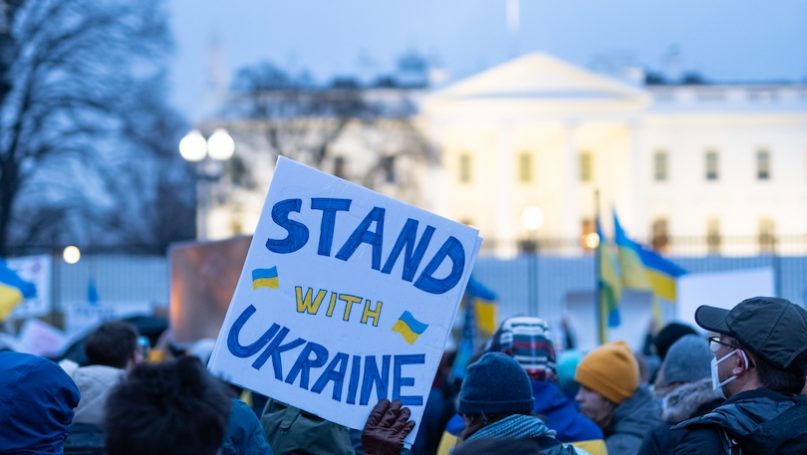
The Western media is full of discussion concerning the different forms of assistance that governments, organisations and individuals can provide for the Ukraine. This extends from their governments’ sponsoring and shipping of military equipment, to the subsidisation of flat owners to provide accommodation for refugees fleeing the war-torn region. Much of this discussion uses the language of humanitarianism to distinguish some forms of aid from others. However, the use of the term ‘humanitarian’ to provide aid in a conflict zone is often misleading and blind to the consequences of aid and its impact. It is clear that humanitarian aid for someone or something is instrumental and selective, rather than humanitarian per se. This article argues that current aid discourses break with universalist understandings of humanitarianism and, more importantly, that humanitarian aid can be a factor in the internationalisation of the conflict.
Humanitarianism was historically based on a universalist understanding of aid on the basis of needs alone. When Henry Dunant founded the Red Cross, following the slaughter of the Battle of Solferino in 1859, it was on the principle of aiding any solider regardless of which side they were on. The connection between humanitarian aid and militarism was clear. Soldiers were patched up so they could continue fighting. What distinguished humanitarianism was that it was not concerned with taking sides in the conflict. Humanitarianism was grounded in a universalism that saw people without making distinctions between them or categorising them.
It is a highly selective version of ‘humanitarianism’ that seems to be the norm in humanitarian discourse over the war in Ukraine. For example, there has been a heightened congratulation of governments which have accepted refugees from the Ukraine, even if they are students or workers from abroad and not Ukrainian citizens. However, a humanitarian position would be to support entry into the country for refugees, regardless of country of origin, not just sing the praises of states that say: ‘all refugees from the Ukraine are welcome’.
Humanitarian aid that is selective, to people from one state or region, even if they are blind to their nationality or identification, is not disinterested and not humanitarian. This is especially the case if we consider the articulation of a global ‘refugee hierarchy’, a point powerfully made by Piyumani Panchali Ranasinghe and Khalid Dader, here on E-International Relations.
However, the problem of humanitarianism is not merely the selective use of the term. Humanitarian support in war cannot be separated from the war itself. This aid is obviously not neutral in a conflict or war situation, and, more importantly, it may not contribute to saving lives. Sometimes humanitarian aid may prolong war and increase the loss of life rather than alleviate suffering. Supporting any side of a conflict with aid (particularly one on the wrong side of an asymmetric war), whether this is in terms of weapons (only for defensive purposes, of course) or non-military aid and humanitarian assistance, is obviously provisioning and enabling war to continue on that territory. More to the point, such aid internationalises the conflict.
There has been little commentary on the fact that Ukrainian refugees consist of women and children but not men of military age. Moving women and children away from the conflict zone clears the area for combat. In fact, according to the media coverage, men are travelling across Ukraine’s borders, returning to join the resistance. The Ukrainian defence against Russian intervention is desperate and dependent upon international support. In this context, it makes no sense to think that ‘humanitarian’ actions are neutral and universal, rather than a vital part of the war effort.
The former Ukrainian Prime Minister, Volodymyr Groysman, has argued that humanitarian aid, specifically aid for refugees, was crucial in this regard. As the syndicated PA news agency states:
Red tape holding up refugees from reaching the UK could be distracting husbands and fathers left behind to fight Russian forces as they worry about the safety of their families who have fled… He [Groysman] added: “You also need to understand that each father or each husband who is now holding arms in his hands, he is really distracted from this war with the fact if he hears that there are some kind of technical difficulties which his family is suffering.”
As students of International Relations, we are presumably aware that the internationalisation of conflict is problematic. This does not necessarily mean that other states will be drawn into the war. When a conflict is internationalised war no longer reflects the balance of forces on the ground, in the local or regional area, but is overdetermined by external forces. The war is no longer between the nominal states involved, but rather becomes shaped by a larger agenda increasingly set by external powers. Humanitarian assistance can easily become part of this process.
While international aid is welcomed by parties to a conflict, the internationalisation of the conflict can be destabilising because there is less pressure to find the compromises necessary for peace agreement. Now, as it looks as if a peace agreement is becoming viable, it also seems that the terms of non-membership of NATO and the European Union and recognition of a Russian sphere of influence in the south and the east could have been agreed much earlier and with much less loss of life.
Further Reading on E-International Relations
- Opinion – Russia’s Choices in Ukraine
- Opinion – War in Ukraine: Why We Should Say No to International Civil Society
- Opinion – On and Beyond Whataboutism in the Russia-Ukraine War
- Opinion – Reducing Nuclear Fears to Negotiate a Winning Peace in Ukraine
- Opinion – ‘Resilient Ukraine’ and the Future of War in Europe
- Impact of War and Prospects for Peace between Russia and Ukraine